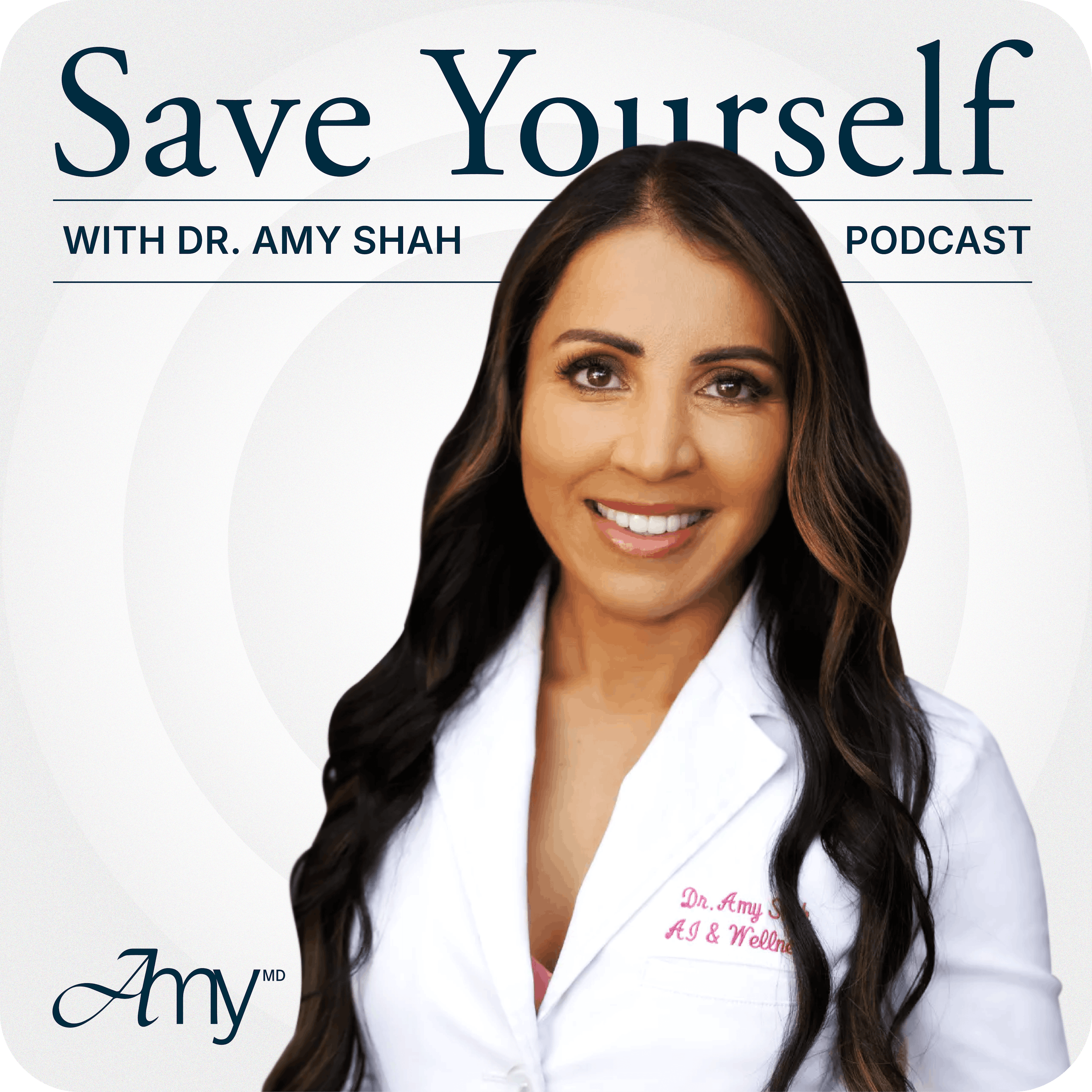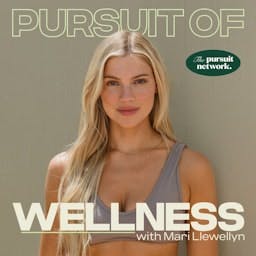.jpg)
Mindfully Integrative Show
Welcome to the Mindfully Integrative Podcast! We are dedicated to featuring inspirational and successful individuals who have embraced mindful investing to achieve optimal integrative wellness. Our podcast dives into all aspects of mindfully incorporating integrative functional health into our lives, aiming to help create a more balanced and fulfilling life. New episodes are released every Friday and cover a wide range of informative and entertaining topics, interviews, and discussions.
We explore a mindful approach to the mind-body connection with guests discussing various topics in integrative holistic health. This includes areas such as whole health, functional medicine, spiritual health, financial health, mental health, lifestyle health, mindset shifts, physical health, digital health, nutrition, gut health, sexual health, body positivity, family health, pet health, business health, and life purpose, among others.
Dr. Damaris G. is an Integrative Doctor of Nursing Practice, a Family Nurse Practitioner, a mom, and a veteran. For collaboration, interviews, or to say hi, you can contact her via email at damaris@mindfullyintegrative.com. You can also find her on LinkedIn at or https://www.linkedin.com/in/damarisdnp/. To join our membership and access resources, visit our website at https://mindfullyintegrative.com .
Please note that the information shared here is for informational and educational purposes only and should not be considered medical advice. Always consult with a physician or other licensed healthcare provider when making healthcare decisions. Enjoy the podcast!
Mindfully Integrative Show
Unlocking Autoimmune Secrets: Gut Health, Dietary Choices, and Holistic Wellness
Unlock the secrets of managing autoimmune dysregulation with insights from Damaris Maria Grossman, an integrated family nurse practitioner. Ever wondered how genetics, trauma, or even the food you eat could play havoc with your immune system? Discover how these factors contribute to conditions like lupus and rheumatoid arthritis and how you can take charge of your health by nurturing your gut microbiome. We explore the power of dietary changes, from the soothing qualities of bone broth to the gut-friendly benefits of fermented foods and high-fiber vegetables. Whether you're a meat eater or vegetarian, learn how to reintroduce nutrient-dense foods and remove inflammatory triggers to reclaim your health.
But that's not all. Dive into a holistic approach to immune system regulation as we decode the role of hormones, supplements, and lifestyle adjustments. From the vitality-boosting effects of magnesium and B vitamins to the balancing magic of adaptogens like rhodiola and ashwagandha, there's a wealth of natural support waiting for you. Embrace mindful practices, prioritize restful sleep, and customize your movement routines to fit your needs. Join us as we weave together the threads of stress management, hydration, nutrition, and exercise into a tapestry of well-being, inviting you to integrate these mindful practices into your daily life.
Sponsor Affiliates
Empowering Your Health
Get YOUR Own
Joburg Protein Snacks
Discount Code: Damaris15 Or Damaris18
Feeling need to Lose Weight & Become metabolically Healthy
GET METABOLIC COURSE GLP 1 REseT
This course is designed for individuals looking to optimize their metabolic health through integrative and functional medicine approaches. Whether you're on a GLP-1 medication or seeking natural ways to enhance your metabolic function, this course provides actionable steps, expert insights, and a personalized roadmap sustainable wellness.
Are you feeling stressed, tired, or Metabolism imbalanced?
Take advantage of our free mindful steps to help improve your well-being.
ENJOY ONE OF our Books
Mindful Ways Health Wealth & Life
https://stan.store/Mindfullyintegrative
Join Yearly membership ALL IN ONE FUNCTION HEALTH
Ask Us for help...
Hi, how are you? So I'm Damaris Maria Grossman and I'm an integrated family nurse practitioner and you know, I just have been thinking about the top three things that cause inflammatory or like an autoimmune dysregulation in the body. Granted, it's different for each person but um, there has been shown like kind of like triggers that make it worse for individuals and if they actually will um get better or if they need to have it suppressed. But the real goal is to regulate and modulate the autoimmune system and then see if you can kind of improve it and ways to do that. So the top areas why people usually get inflammatory markers or dysregulation is first, it's genetics.
Speaker 1:Maybe you may be predisposed to a lupus, a rheumatoid arthritis, you may have had an exposure of some sort toxin treatments, infections and such. Then there's a trigger. Maybe that is a worst case scenario. Sometimes that could be infection. That could be the worst. An accident, a car accident, a trauma, something that triggered the trauma, something that triggered the, or an actual injury itself, personal injury or something that was ingested. There's many things that could cause the body and stressors. Usually oxidative stress, could also be a trigger that may, or something in the past that might have mediated this response Due to that. Then there's the third part of it is so those two may happen and some individuals may have some like, once in a while, maybe an XML once in a while intermittent pain. But then there's that third level where they get to their gut biome has been ruined. So what happens is that these three tiers. One, it's a genetic component. That doesn't mean just because you have genetic history you're going to have an illness. I have genetic history to have type two diabetes. Will I have type two diabetes at some point? I may. I may have it at a later age eighties, nineties, hopefully not now. Then that trigger component was it a car accident? Was it a trauma? Was it something that caused? Was an infection? Was it induced toxin? Was it some sort of something? You know that? An injury, stressful moment, what have you then that triggers the immune system to want to jolt up?
Speaker 1:Then the next part of the equation is what is going on in your microbiome? The microbiome is a second immune system. So when that gets altered, then you notice, start noticing anxiety, depression, altered mood, altered things that, if you, they call it leaky gut. But first it's dysbiosis, and dysbiosis is an irregularity of the microbiome within the gut and then leaky gut, or like an intestinal permeability, is over time you can eat poorly, stress-induced, food-induced nutrition, less, you know less things and maybe an exposure to an infection or some sort of toxin in some manner that had over time degraded your microbiome and your the walls of that stomach. So then when it's opened up, then it will seep out into the rest of the circulatory system and in turn we'll bring that inflammation, whether it's from insulin, whether it's an infection, whether it's you name it, you it could be um, a dysregulation.
Speaker 1:Now, for individuals it's different, everybody is a different reason, but with that, the only way for you know working to get it better is, um, with a good health restoration and balancing out your immune system. So it's not about, like the difference between, in a general conventional consideration is obviously, if you're extreme you may have to have a suppression and acute case and things are not getting better than just a microbiome work may not be helpful and they may need an acute medications, but really ways of improving your microbiome and improving your immune system and trying to modulate it as number one. Number one is healing your intestinal permeability, which is the so-called leaky gut. And how do we do that and my favorite really is you're trying to remove the trigger. So the main part of that is you incorporate the five R's I put in one podcast. I say six R's, but really you're trying to remove those things that have caused the dysregulation. And that doesn't mean that you're going to be on a removal of everything for a period of time. But to lessen the triggers and lessen the inflammatory process, you need at least four to six weeks to get to at least an optimal range.
Speaker 1:Now, when you're helping healing the gut, my favorite, my favorite, favorite favorite will be bone broth, fermented foods, high fiber vegetables and like healthy fats. So if you're a vegetarian, there are algae consumptions and juices, but there are some algae and spirulina and coleros that can be used in place of the bone broths. But, hands down, bone broths are one of the best collagen and gut lining treatments. Now, supplements I use a variety of different things. It varies depending upon the client, but really it always comes down to what are you putting into your body. So, instead of just eliminating things three to four weeks, I think that's important, but I really think you know in reality and sustainability is, what can you do to bring in the nutrient, dense, quality things back into your diet and start thinking that way on a regular basis.
Speaker 1:Now to heal the gut, you know you need to. You know remove the junk. Then you have to reintroduce because your dysbiosis means that the gut lining or the microbiome in there has been so irregular and it hasn't been corrected properly. So what that means is that you need to have it regulated. The dysbiosis means that there's too much of the bad stuff and none of the good stuff and we're, you know, populating the wrong things and it's because of food toxins, environmental stressors, not taking in the right good foods, not, you know, making appropriate choices. And then there's, you know, components. So majority of clients that are in this autoimmune response, most of them, if I can work on healing their gut not that it is gone away, but it is managed in a really manageable, like almost remissioned way. And once they kind of find their way, after we've kind of healed that general gut lining, they can find a way to have like the other side. Trust me, I have worked with individuals that, and myself included, that when you work on your gut it does improve.
Speaker 1:Now, of course it's not fixing everything, but it does help significantly. Think about like it in the sense of your grandmother's chicken soup for the soul. You know you were given, oh, some garlic herbs and a good old broth. That remedies back in the day really did help significantly for a lot of illnesses and bringing back your immune system to where it needs to be. Now Each person is different but you know, a big part of it is because we've been triggered, whether it was a sensitivity, a toxin, you know, pesticide, herbicide, heavy metal, infection, pathogen, you know, sometimes infections come array of things and that will trigger on those with autoimmune dysregulation, you'll notice their Epstein-Barr might be increased, their herpes zoster I mean herpes simplex may be increased, they may have some viral load a little bit higher, and it's just basically, it's saying that the body's starting to, you know, tick up and need to regulate.
Speaker 1:Now how do you balance it? What is ways to do that Improving ways? Ways to do that Improving ways, hands down, is the gut right. So we work on the lining, we regulate it by giving and bringing the body its nutrient dense foods. Now there's an array of things that can be given, but always, you know, good quality fatty fishes, omega-3s, and think of that because the cellular level it's made up of bilater, of phospholipids. So if you're giving your body quality oils and lipid and bringing back that layer so it's not being broken down, that fish or salmon or omega-3s is giving you that you can also get it with algae and colaria Spices helping with inflammation.
Speaker 1:So inflammatory use spices that are really beneficial turmeric, saffron, ginger, garlic. You'll hear me say things quite often, but think of it like anti-inflammatory turmeric, garlic, saffron, ginger, cinnamon, garlic, saffron, ginger, cinnamon and I think the more spices, in a way some of them are just so beneficial for the body and nutrient quality. Now, when it comes to greens, the more greens usually the better. The best ones are usually kale, spinach and chard. The greener the better. Or you can do some micro greens that are out there.
Speaker 1:If you don't really have the time to incorporate Now, always nutrition and food would be the best start, but the next route would be, you know, vitamin D with K2. And I usually around 4,000, two to 4,000, as you're starting um. Omega-3 fish oil uh, if you have to take it. Or an algae based vegetarian, that's around 2000 milligrams. Um. Turmeric or saffron, around 500 to a thousand, depending upon. Now, this is obviously if you're not going to take it on your own or try to find some way. Chrysanthin is also another type of anti-inflammatory to help with regulation.
Speaker 1:Now, would you believe, your hormones are going to regulate your immune system also. So, in turn, you know, when you use a little bit of magnesium, maybe for nighttime, some B vitamins to you know overall help your cellular metabolism and your and your um supports your energy. Think of adaptogens. Um, of course I love um rhodiola and ashwagandha, um, there's a couple of others available. And then you know, if there is a need for medications, there are options. Um, a very, very good immune, natural um herbs and Chinese herbs are mushrooms. I don't love mushrooms, but I know that the blends of mushrooms, specifically reishi, cordyceps, are excellent for building immune and modulating the immune system. So there are a bunch of blends out there that you can get that are like grounded, that are a way of modulating and, you know, taking in that nutritional value to help regulate your system a little bit. And that's a way.
Speaker 1:And, you know, optimally, lifestyle management will always be key. So how do we, you know, regulate our stress management? Is it mindfulness, is it yoga, is it guided meditation? I have many videos and many things relating to mindfulness and you know that it will be a key foundation. The next would be sleep.
Speaker 1:How do you modulate your sleep on a regular basis? It's quite important, I mean. I can tell you even for myself, like when I'm not having a good day, oh my gosh, if I have not slept the night before, my next day really can be a struggle. So I then have to really, really uptick on my hydration, really uptick on my anti-inflammatories and nutrition, because I will, you know, I can struggle just like you and I, you know, just like another person. So it's just kind of taking that into consideration and then move whenever that is for you. If you're obviously in pain, that might be less for you, but it's got to be regulated. If you have any other questions or you want to reach out at any time, feel free. I love answering and talking about this because it's near and dear. Anything reference to integrating a better health and finding mindful ways each and every day. Yeah,
Podcasts we love
Check out these other fine podcasts recommended by us, not an algorithm.

The Dr. Hyman Show
Dr. Mark Hyman
Functional Fertility with Dr. Kalea Wattles
Kalea Wattles
On Health for Women
Aviva Romm
Save Yourself With Dr. Amy Shah
Dr. Amy Shah
Huberman Lab
Scicomm Media
The Peter Attia Drive
Peter Attia, MD
The Metabolic Classroom with Dr. Ben Bikman
Insulin IQ
FoundMyFitness
Rhonda Patrick, Ph.D.
Change Your Brain Every Day
Dr Daniel & Tana Amen
The Dr. Josh Axe Show
Dr. Josh Axe
Pursuit of Wellness
Mari Llewellyn & Pursuit Network
Feel Better, Live More with Dr Rangan Chatterjee
Dr Rangan Chatterjee: GP & Author
The Level Up Podcast w/ Paul Alex
Paul Alex Espinoza
Faith Over Fear
Jennifer Slattery, Faith Over Fear Author and Speaker
